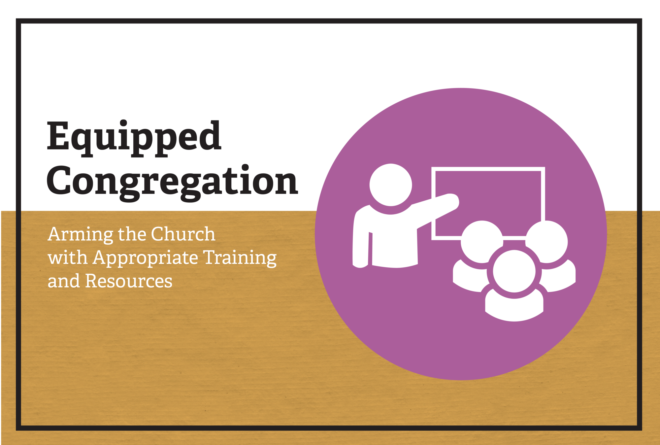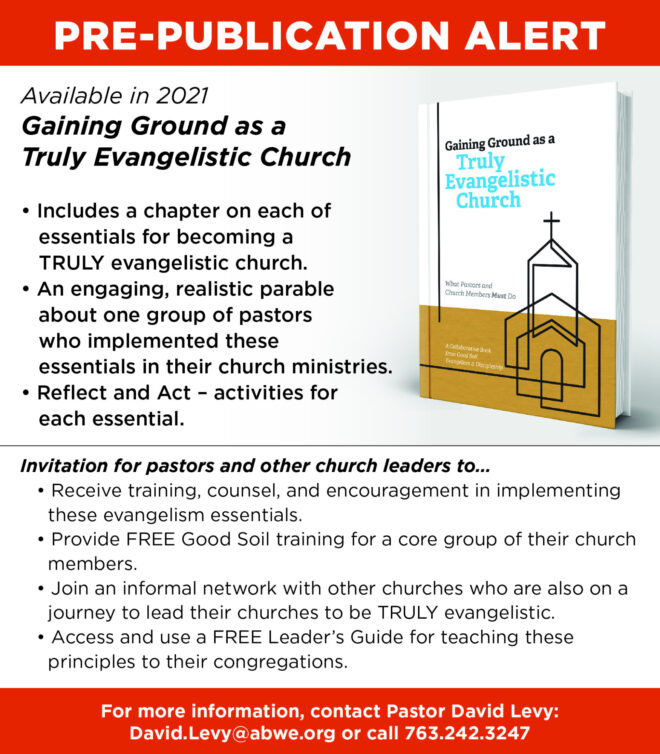Equipped Congregation: Arming the Church with Appropriate Training and Resources 6th Essential for a TRULY Evangelistic Church

“Training: The Foundation for Success in Combat”
That’s what our military leaders think about the importance of training. They would never send their personnel into battle without proper training and the best available resources.
How well do we equip our church members for spiritual warfare—particularly the battle to rescue lost souls?
Many of you who read this are shepherds (pastors) or teachers. I assume that virtually all of you are “saints” (true born-again believers) who have been commissioned by our Lord to do the work of ministering. In one of the most important directives for church ministry in all of the New Testament, the Apostle Paul clearly stated the responsibility of church leaders to prepare believers for ministry.

The original Greek word for equip that Paul used is only found in this one text in the New Testament. It means to render effective and workable something that is not yet in a condition to function as it should.
I remember the early months of my life as a Christian. It didn’t take me long to realize I needed to (and wanted to) lead my unsaved friends to Jesus, but I was not yet equipped. I didn’t feel confident enough to explain how they could experience forgiveness of sin and receive eternal life, as I had. So I would share my story with them and then take them to my pastor’s house—sometimes in the middle of the night—in order that he could explain the gospel to them and help them place their faith in Jesus. Thankfully, my pastor began to equip me for the ministry of evangelism. He probably got tired of me knocking on his door and getting him out of bed near midnight or after!
My guess is—there are Christians in your church who feel just as inadequate as I did, even though they were saved years ago. As a pastor-teacher, it is one of your most important jobs to equip your congregation for ministry, especially the Great Commission ministry. We would love to help you with that responsibility. And if you are a Christian who is not confident in explaining the gospel and helping unbelievers come to faith in Jesus, this article can help you too.
Five Keys for Effective Great Commission Equipping
First: As culture changes, the content and methods for Great Commission equipping must also change.
If you grew up in church prior to the last decade or two of the 20th Century, you would know that ministry was much different then, than now. In earlier decades, most people in North America knew who God is, who Jesus is, what the Bible is all about. They were familiar with the stories of Adam and Eve, the true significance of Christmas, the Crucifixion and Easter story, etc.
Chances are there were not very many Muslims, Hindus, Buddhists, Spiritists, Postmoderns, or hard-core atheists in your township, city, or county at that time. And most of the basic Biblical concepts, such as sin, salvation, heaven, and hell were generally known, albeit perhaps not clearly.
In those days, a presentation of the gospel of Jesus Christ could begin with:
“God loves you and has a wonderful plan for your life.”
“If you stood before God and He asked you, ‘Why should I let you into my heaven,’ what would you say?”
“The Bible says, for all have sinned and come short of the glory of God.”
The increasing degree of Biblical illiteracy in North America has necessitated a change in the way we explain the gospel to non-Christians. As followers of Jesus today, we all need to be equipped to share the Bible’s big story, the historical-Biblical context for basic gospel truths. Otherwise, concepts such as “God,” “sin,” “Jesus died for you,” and “you need to be saved,”

mean nothing to many contemporary North Americans. Evangelism training for today and the future must adapt to the increasingly secular and pluralistic cultural changes happening all around most of us.
The positive side of this otherwise depressing cultural change is that many Americans, including unbelievers, are curious about the Bible and want to know more. A recent American Bible Society survey revealed that 63% of Americans expressed some curiosity to know about the Bible and its teachings, with 29% registering a strong desire. Sixty-one percent were interested in knowing more about Jesus Christ and 29% strongly agreed.
Evangelism resources that promise Bible-curious non-Christians an opportunity to understand the overall message and meaning of the Bible can be an attractive way to engage them with God’s redemptive story.
Second: Evangelism training should blend 1essential Bible-based content with 2practical “how-to” techniques and 3life-like simulations, in preparation for 4real-life opportunities to share the gospel.
- Essential Bible-based Content: Contrary to what some timid Christians may think, they don’t need to be Bible scholars to lead unbelievers to Jesus, but some basic Biblical instruction is important. And if they use the appropriate evangelism resources, most of the Biblical content they need will be embedded in the resources.
- Practical “How-To” Techniques: Some evangelism training programs consist of teaching trainees word-for-word sales-like pitches. And unbelievers recognize them as such from the first few words. Training for authentic evangelism is much more flexible. It provides basic tips for helping Christians be themselves in a way that doesn’t force them into a methodological straight jacket. The best evangelism training and resources will balance method with individuality, structure with flexibility, and content with personalization—tips and techniques, not rote and rigid talking points.
- Life-Like Simulations: In military training, “the goal is for military forces entering combat to have ‘been there before’ so that they can know how to win.” Simulations are a safe way to help Christians feel like they have “been there before,” before they encounter some of the common situations they fear are coming. In today’s multi-cultural pluralistic societies, evangelism training should include simulations that prepare Christ-followers to share the gospel with people from a variety of non-Christian worldview settings. We call it worldview relevant evangelism training.
- Real-life Evangelism Opportunities: We can never prepare everyone for everything, but we can prepare evangelism trainees how to react when they feel trapped, not knowing what to say. We need to prepare them to say, “I don’t know, but I will find out.” We should see their early “brick wall” experiences as teachable moments and provide the debriefing opportunities that will allow us to deepen and expand their training.
Third: Evangelism training should be transferable, clear and simple enough that once trained a trainee can use it to train others, who can train others, who can train others.
Transferability = to cause to pass from one person to another. It’s the “I learn, now I train,” learn-train, learn-train, learn-train process that Paul modeled and advocated.

Transferability has always been at the forefront of Good Soil philosophy and methodology. That is why we…
- Create free Leader’s Guides and Class Facilitator Guides to accompany many of our evangelism and discipleship resources.
- Offer Good Soil Trainer Certification Workshops that follow our Basic Seminars.
- Developed Gaining Ground with Good Soil, which we think of as a “Good Soil seminar in a story book.” And training resources to accompany that book are available as free downloads.
And it is why we have embedded the essence of Good Soil training in visual models that make it easy for you to teach others what you have learned. And we have made our three primary visual models available as free downloads from our website (www.GoodSoil.com).
Fourth: Evangelism training and resources should go “hand-in-glove.”

Think of training as the “hands” and evangelism resources as the “gloves.” They both work better together when they are well-matched.
For example, military training is not about rifles in general or generic parachutes. Military personnel are trained to use the rifle they will carry and the kind of parachute they will rely on when they make their jumps. Best practices training is matched to specific resources.
Good Soil’s The Story of Hope, The Way to Joy, the Chronological Bridge to Life, The Roots of Faith, and all of its other evangelism and discipleship resources were custom-designed to be the “gloves” that fit the “hands” of Good Soil Basic Seminar training.
Fifth: You can’t expect one-time “boot camp” evangelism training to be all of the training your church members will ever need.
We have trained hundreds of pastors in Good Soil seminars—across North America and around the world. In virtually all cases, pastors leave Good Soil seminars excited about seeing their churches implement what they have learned. But, unfortunately, some of them never equip their congregations with the training and resources they learned in the seminar—they never take the first step of transferring. Thus, training for them is a dead-end street. And some other pastors who do provide some parts or all of the Good Soil training for their congregations, assume a one-time boot camp experience is all they need to offer.

Ongoing training is vital—boosters, enhancers, refreshers, and extenders. And there are lots of ways (and resources) to keep our congregations “battle-ready.” Good Soil Evangelism and Discipleship can help you with that.
May God help us as followers of Jesus to take our marching orders as seriously as the military. Eternal destinies are even more important than mortal lives!
Here’s a look back and a look forward to the entire set of articles in this “Twelve Essentials to a TRULY Evangelistic Church” series:
- The Evangelistic Pastor
- E-Team
- THE Mission
- Local Focus
- Congregational Warmth
- Equipped Congregation
- Basic Discipleship
- Peer Accountability
- Evangelistic Praying
- Shared Rejoicing
- Strategic Simplicity
- Persistent Pursuit




